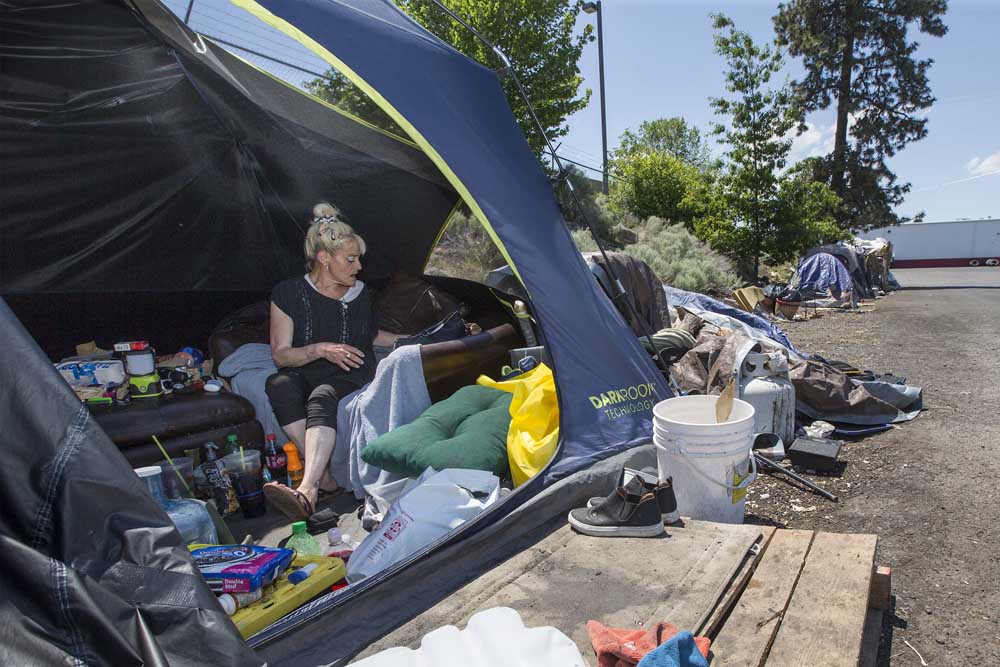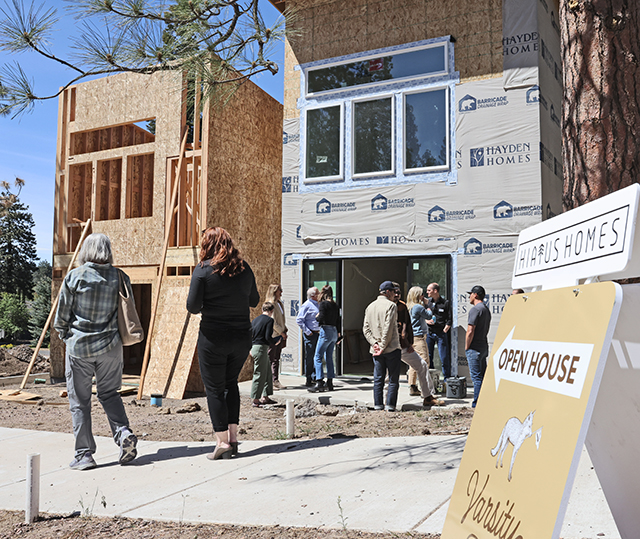Homeless clean up slated for Emerson Avenue in Bend
Published 5:00 am Friday, June 4, 2021

- ORIG 06/03/21 Dawn Kane, 49, looks through her belongings while sitting in her tent along NE Emerson Avenue in Bend on Thursday, June 3, 2021.
In the last nine months, Dawn Kane has made her home out of a blue and green tent off the side of Emerson Avenue in Bend.
The 49-year-old Kane moved to the area after spending roughly 10 years living on Bureau of Land Management land near Redmond in the hopes of being closer to services. It worked — Kane qualified for a housing voucher in November.
But after more than six months, she has yet to be placed in a home because there are none available in Central Oregon, she said. And now, the city of Bend will be telling her to pack up and leave Emerson Avenue. This is because the Bend City Council gave City Manager Eric King the authority Wednesday to move people out of the right of way when camps are deemed “unsafe.”
“I just haven’t had the best luck in the world as far as things coming my way,” she said. “When good things happen, they go away.”
Kane is one of dozens of campers who will be moved off Emerson Avenue near Bi-Mart in the near future. The road is home to roughly 38 camps, according to King, and has been growing in size since the beginning of this year.
Things that can make a campsite unsafe, according to the administrative order, are camps being in or near the roadway, environmental issues like trash or human waste, or the “amount or seriousness” of crime being reported by the Bend Police.
In a document given to the council, Bend Police cite accumulation of trash and waste, “multiple crime reports taken” in the area and a fire incident where a tent burned down as reasons to justify moving the camp.
Outreach efforts to notify people are slated for sometime next week, King said. While the administrative policy says the city must give 72 hours notice, King said the intention is to spend longer than that doing outreach.
“This is not a blanket statement by any means to those individuals experiencing homelessness. There are just certain situations where health and safety is a concern,” King said.
The number of unhoused people has continued to increase in Central Oregon, bringing the issue to the forefront of local politics. Preliminary numbers from a Point in Time count conducted in January show a 13% increase in the population over last year — an estimate that is likely to be lower than reality, said Colleen Thomas, the Deschutes County homeless services coordinator, in the meeting Wednesday.
The administrative policy comes after the city received several complaints about homeless people around the city, and several specifically referencing Emerson Avenue. In a public records request, The Bulletin received dozens of emails sent to the City Council complaining about the encampments over the past two months.
Some raised concerns about feeling unsafe around encampments. Others cited trash and other waste as a part of their frustration. But above all there was a sense of frustration about the character of the city changing, and fears that Bend is turning into a city like Portland and Seattle, which have large homeless populations.
“Bend is turning into Portland and I want out. And I will take my substantial property taxes with me,” a resident named Joan Rowe wrote to the council in May.
But advocates for the homeless call the new policy inhumane when the city has no place for people to go.
“If you are not willing to provide a safe place for these people to move, you have a moral obligation to not to move them,” Ashley Nissa, a Culver resident who says she provides services to homeless people in Bend, told the council Wednesday.
Several homeless activists called into the Wednesday meeting irritated by the fact that trash and waste were being used as reasons to clear the camp when volunteers have set up portable toilets and offer trash service to this area specifically to address these issues. Some also challenged the narrative that people camping along the roadway was the problem.
“They’re not the ones making the street unsafe; it’s the 10-ton trucks going 60 mph,” Bend resident Moey Newbold said to the council.
Some asked why the city doesn’t just close the road to traffic until there are enough places for people to go. When asked whether this was ever considered, King said it had not been, and that typically the city only closes streets for short-term things like events rather than indeterminate closures.
A long-term closure would require a significant public process, he said.
The city does have several homeless initiatives in the works. A low barrier shelter run by Shepherd’s House Ministries with 70 beds opened on Tuesday, making it Bend’s first long-term shelter for anyone.
The city is also in the process of purchasing the Bend Value Inn, which will provide roughly 20 shelter beds, with money from the state Legislature from a program called Project Turnkey. King also mentioned the city is looking for publicly owned land around the county to create a managed camp.
In Wednesday’s meeting, Councilor Anthony Broadman proposed offering $1.5 million of federal COVID-19 relief money to Deschutes County as a match to any money the county would put in to get the process of planning a managed camp going in the next 30 days.
While homeless advocates are supportive of the city’s efforts to address homelessness, the reality is there is still no place at this point for service providers to tell homeless campers to go. The shelter is a start, but only runs at night, leaving people with nowhere to go during the day.
“We are pushing people back to China Hat, back to Hunnell (Road), people are going right back into little areas in residential areas,” Stacey Witte, the executive director of the homeless nonprofit REACH, said Wednesday. “We are not taking a problem away. We are pushing it to another location.”
When asked why the city couldn’t wait until more shelter beds came online before moving campers, King said the city has to balance looking at ways to provide housing capacity for homeless people and the responsibility of managing the city’s rights of ways.
James Cook, a member of the Central Oregon Leadership Coalition, criticized the city for the lack of communication about the administrative policy before bringing it to the council, and compared the situation to the city’s efforts to remove campers on Juniper Ridge last year.
“The city announces something and then gives more time for outreach, and then ultimately goes ahead and then pats itself on the back (for) working with service providers,” Cook said Tuesday.
Whenever the city does issue notices, Kane said her plan is to go to another camp site in Bend she has identified.
Because of a traumatic brain injury that happened a few years ago, Kane said she is unable to work due to memory loss and being almost completely blind. Before that, she became homeless while running away from an abusive spouse and while battling an addiction, leaving her few resources to find a place to live on her own.
She hopes housing will become available so she can use her voucher, but with the price of housing skyrocketing in Bend, she did not appear confident.
While standing by her tent in the sweltering heat radiating from the asphalt, Kane did issue a warning to those who judge people in her situation.
“Don’t ever think you’re exempt,” she said. “They could just as easily be in this spot.”
Editor’s note: This article has been corrected. The original version misstated James Cook’s position with the Central Oregon Leadership Coalition. The Bulletin regrets the error.






